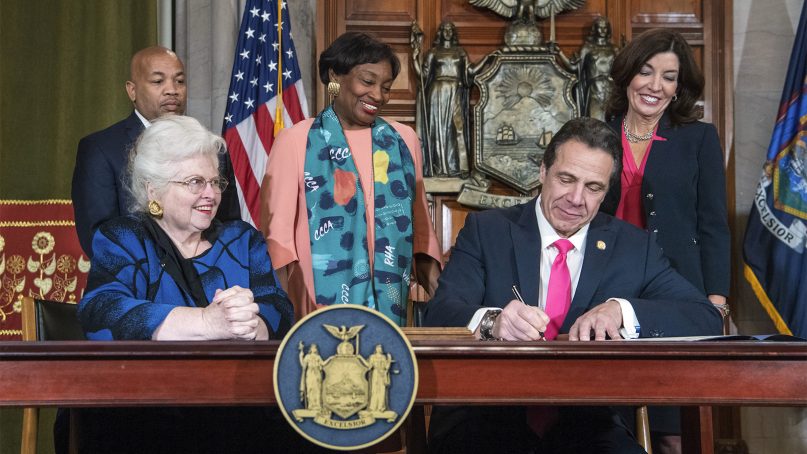(RNS) — New York state just enacted the Reproductive Health Act (RHA), which updates and strengthens the right to choose an abortion in the state. High-profile criticism of the law has come principally from the Catholic Church, including calls for the state’s Catholic governor, Andrew Cuomo, to be excommunicated.
Yet the law reflects the values shared by many pro-choice clergy and laypeople committed to Protestant, Jewish and Catholic beliefs.
At the Religious Coalition for Reproductive Choice (RCRC), the largest national interfaith, abortion rights organization, we approach the highly personal reproductive decision-making process guided first and foremost by compassion. We acknowledge the complex, challenging and widely varying circumstances each woman confronts and the impact of these choices on her family.
This comes as no surprise to those who know our history.
Our organization evolved from the pre-Roe Clergy Consultation Service (CCS), whose more than 1,000 interfaith members — ministers, rabbis and some priests and nuns — acted on conscience to defy abortion bans. Starting in 1967, they quietly offered women all-options pastoral care and, if requested, referrals to safe but illegal abortion providers.
In New York, CCS members had also been advocating for making abortion legal, which occurred with a dramatic, tie-breaking vote on April 9, 1970. That law had been on the books until last week’s passage of RHA.
Today’s religiously based opposition to RHA stems from the teaching that an embryo is the equivalent of a person with rights of its own. However, not all religions agree on when life begins. Some focus on fetal viability. Others say that human life begins at conception or once a baby takes its first breath.
Our values cherish women’s free will to make decisions to control their own bodies and lives. This freedom is a gift from God, who created each person in the divine image, entrusting each with the right and capacity to discern our personal courses of action.
New York’s new law takes a significant step toward protecting that free will. It ensures that the right to choose an abortion in the state will endure, even if the U.S. Supreme Court should overturn the federal protections under Roe v. Wade. It also protects the safety of women who opt for abortions, because, as the American College of Obstetricians and Gynecologists has stated, where abortion is legal, it is safe.
Separating religious beliefs from public policy is another bedrock of pro-choice religious values.
Policies such as RHA allow people of all religions to follow their own faiths and consciences in their own lives. Abortion foes for years have strived to shape laws and regulations that impose their own strict religious tenets on others in our pluralistic society. Pro-choice people of many faiths, on the other hand, agree that when a woman is making reproductive decisions, others’ religious beliefs should not interfere.
Pro-choice religious values respect the purpose of reproductive health care centers and the work of health care providers dedicated to meeting the reproductive needs women have discerned for themselves. Clergy of many faiths have joined RCRC in blessing abortion clinics as sacred spaces for serving women seeking medical help.
Dr. Willie Parker, an abortion provider and RCRC leader whose Christian faith supports his work, has written about how deeply he has been influenced by the biblical story of the Good Samaritan. The story teaches us to shed our self-interest and show true caring for people in need.
New York’s new statute supports this value in two ways.
First, it decriminalizes abortion care by removing it from the penal code. Criminalization of health care providers, and even of pregnant women attempting to end their own pregnancies, derives from belief in fetal personhood, which not all faiths accept.
Second, RHA makes abortion care more accessible, because a wider range of health care professionals can provide the procedure. In addition to doctors, the law permits abortion care by any health care professional who is licensed, certified or authorized and has abortion within their scope of practice. This includes midwives, physician assistants and nurse practitioners.
RHA permits abortions within 24 weeks of pregnancy or at another point when a fetus is determined not to be viable or when abortion would protect the woman’s health or save her life.
We support women having the right to access abortion care later in pregnancy. In fact, one year ago, RCRC held an interfaith ceremony bringing blessings on one of the very few later-term abortion clinics in the nation, Dr. LeRoy Carhart’s clinic in Bethesda, Md.
Dr. Carhart works with girls, women and couples facing an array of wrenching circumstances that would test any mother to be. Many had written letters to Dr. Carhart thanking him and his staff for the gentle and respectful treatment they received in very challenging times. This is the kind of compassion our values embrace — giving others the freedom to look deep into their hearts and to be supported in doing what they feel is best without shame or stigma.
Passage of RHA is a landmark — the first time in six years of trying that the law made it through the state Senate. For pro-choice people of faith, however, the law is also a victory of another sort.
It is the next step in the battle progressive faith communities have been fighting since the 1960s, acting on their consciences to resist abortion bans that forced pregnant women, regardless of their circumstances, to either bear a child or risk harm or even death to seek an abortion.
To pro-choice people of faith, that was wrong then, and it’s wrong now.
Rev. Dr. Cari Jackson is the executive for religious leadership and advocacy at the Religious Coalition for Reproductive Choice. The views expressed in this commentary do not necessarily represent those of Religion News Service.





